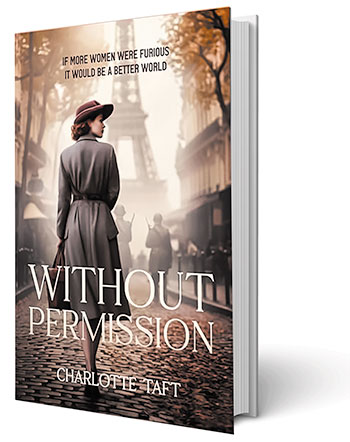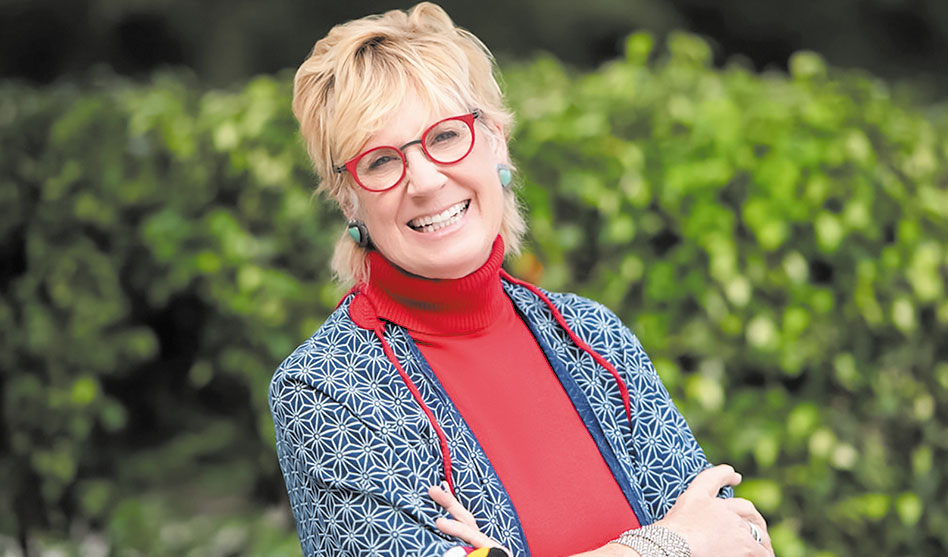Charlotte Taft
Charlotte Taft, a longtime advocate for the women’s, reproductive and LGBTQ rights, has published her first novel
MELISSA WHITLER | NBCU Fellow
Melissa@DallasVoice.com
Reproductive rights advocate Charlotte Taft has published the first book of her new trilogy, Without Permission. The novel follows the life of Jane Smith beginning in Paris in 1939 when Jane is 25 years old.
Taft said she was first inspired by the Madeline books, written by Belgian author Ludwig Bemelmans in 1939. Despite this being a year before the Nazis invaded Paris, in Bemelman’s stories there’s no sense of the distress of the time. Taft wanted to write something a little closer to the truth.
Her novel deals with questions of morality, such as “You can’t be good in occupied Paris without doing things against the law,” Taft explained. So Jane must figure out what she is willing to risk to follow her own sense of morality, as well as sort out her romantic feelings toward other women.
Taft said she first began drafting this story back in 2016. “I was writing in a different mindset because I expected us to have a woman president, for things to get better for abortion care,” Taft recalled.
 But with the actual results of the 2016 presidential election and the 2022 Supreme Court ruling overturning of Roe v. Wade, Taft found herself writing for a very different political climate. “This story goes back to a time when care was based on the needs of the person pregnant and not politics,” Taft said.
But with the actual results of the 2016 presidential election and the 2022 Supreme Court ruling overturning of Roe v. Wade, Taft found herself writing for a very different political climate. “This story goes back to a time when care was based on the needs of the person pregnant and not politics,” Taft said.
Charlotte Taft has an extensive history fighting for women’s rights. She was in college before the U.S. Supreme Court issues its landmark ruling in Roe v. Wade, and she witnessed the beginning of the second wave of the feminist movement.
“There was so much happening at that time,” Taft said. “There was education and big demonstrations. It felt like we were going to solve some of this.”
She continued her work for reproductive rights after the 1973 ruling, eventually running an abortion clinic in Dallas. One of the things she emphasized was allowing patients as much time as they needed to come to a decision about their pregnancy.
“We just assume people know how to come to terms with it, but they don’t,” Taft explained. “The process takes time and is not something we necessarily can do by ourselves.”
Her staff developed a lot of tools to identify patients who needed more time to come to peace about a decision, sometimes spending hours with a patient until they came to a decision right for them. Taft wanted her patients to know that whatever they decided about such an important question would be respected, and she wanted them to have confidence in and be at peace with their decision.
“I have spent 50 years trying to find something abortion is the same as,” said Taft, “and there is nothing pregnancy is the same as.”
Having a child is a unique and complicated experience, with implications for one’s physical and mental health. That is why, Taft said, she felt compelled to write a book, because she wanted to describe abortion care that was based on emotional and spiritual needs, not just a medical process.
She felt like fiction would reach a wider audience, while a nonfiction book wouldn’t have a chance of reaching anyone not already convinced. Her hope for Without Permission is that it will reach those who have had abortions who feel like they have to live in silence and shame. There’s the possibility, she hopes, that someone who has not gotten resolution with their own experience can have healing.
“It has never been about convincing people to get abortions,” Taft explained. “It’s about allowing people to come to the decision that is right for them.”
She feels it is reductionist to say abortion is just a medical procedure, that it is much more complicated and involves emotional and spiritual aspects of well-being. Her work has been to give people the tools to deal with it — not to provide them with the answer, but to help them look at their values in a deeper way and decide for themselves.
“If someone can’t square what they did with their values, they will put it away and ignore it,” said Taft. “A person’s wholeness and sense of their own goodness is essential, otherwise they can’t make sense of it and feel ashamed.”
She wants to flip the concept of morality, focusing on the issues of having a baby without really choosing it. It takes love and courage to make a decision about a pregnancy, no matter what one chooses to do.
Taft also recognizes the parallels between the fight for reproductive justice and LGBTQ rights. In 1985, while continuing her activism, she was outed as a lesbian by her opposition. Thankfully, almost everyone in her inner circle was supportive, and it didn’t change the work she was doing.
“No one would ever be able to guess the number of lesbians in the abortion movement,” Taft said.
For this group, there is a much lower probability of them needing an abortion, yet they recognize that it’s not safe to live in a world where women aren’t allowed autonomy.
“The silence on abortion is similar to the historical silence and shame of the queer community,” explained Taft, as religious and social norms teach there is something wrong with certain ways of living. Because of Taft’s identities, she has experienced firsthand how reproductive rights and LGBTQ rights are intertwined.
The fights echo each other and are based on some of the same legal precedents. Roe v. Wade was not only the basis for access to abortion, but a legal basis for the right to privacy, on which court rulings on marriage equality and the overturning of sodomy laws rest.
“The ruling of Roe v. Wade was about more than abortion,” explained Taft. “It was the country recognizing our wholeness as human beings and respecting us.”
Now doctors are scared to intervene in life-threatening pregnancies because trigger laws put them at risk of criminal charges. Those who might want to receive an abortion are in survival mode and rushed, not allowing them the time to process and come to a confident decision.
By sharing stories like Jane’s in Without Permission, Taft hopes to show readers a different way forward where we accept nothing less than what we deserve.
Without Permission is currently available as an eBook and will be released in paperback on June 12. For more information on the book as well as reproductive resources go to BeforeAndAfterAbortion.com.


